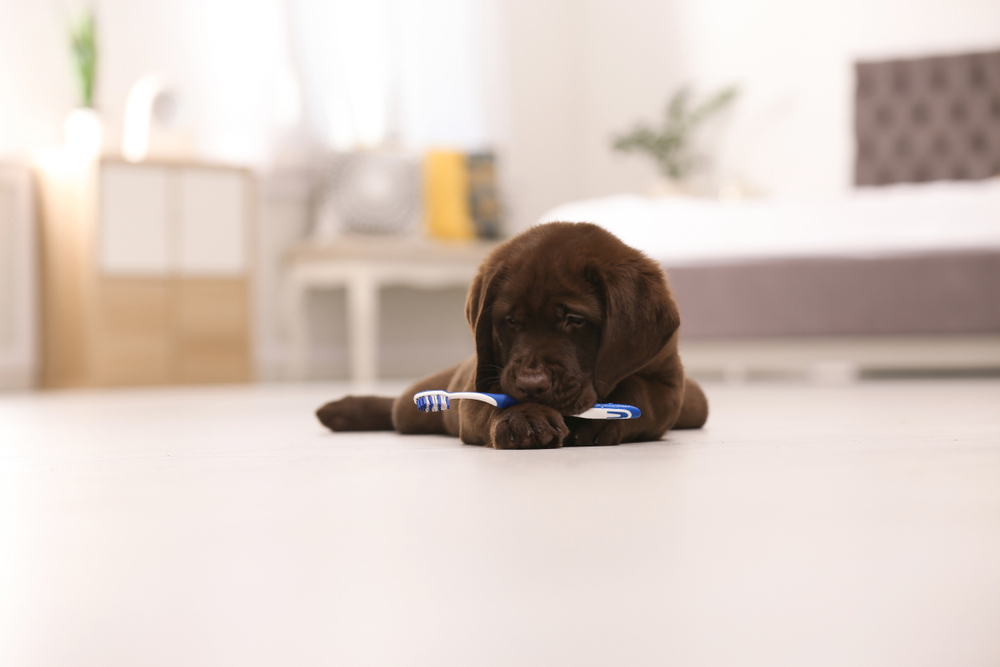4 Tips to Set Your Puppy Up for Success

Puppies are energetic fur balls, who fill our lives with sweet puppy breath and cozy cuddles. However, like human childhood, puppyhood is a critical time to ensure they learn and develop proper manners, social skills, and habits, so they remain healthy through their grey muzzle years. Follow these four tips from your Bayside Animal Hospital team to provide your puppy with the proper care and tools to help set them up for success from puppyhood to adulthood.
#1: Purchase pet health insurance
Puppies require several veterinary visits during their first six months of life, and throughout their life to ensure they are healthy and protected from illness. Many pets will also experience an unexpected accident or illness during their lifetime that may require costly emergency care. Pet health insurance is available to help alleviate the stress of a costly veterinary bill and ensure you are prepared to cover your pet’s unexpected costs. Many pet insurance plans include coverage for wellness and preventive care, which is especially critical during puppyhood, since your puppy’s immune system is still developing. Pet insurance can be used at most veterinary hospitals, including your Bayside Animal Hospital. Some pet insurance providers do not provide coverage for pre-existing conditions, however, so purchasing a plan when your dog is a puppy will ensure they are covered throughout their life. Ensure your puppy’s health insurance plan includes coverage for the following:
- Physical exams
- Surgery
- Hospitalization
- Dental procedures
- Vaccinations and parasite control
- Imaging (i.e., X-rays, ultrasound, MRIs)
- Laboratory tests (i.e., blood work, urine, cultures)
- Behavior consultations
#2: Purchase puppy essentials ahead of time
Puppies require a lot of time and attention, which can make it difficult to find time to buy the many supplies required for their proper care. Consider buying puppy essentials before bringing your pet home, including:
- Grooming — Choose puppy-safe shampoo, nail clippers, and a brush or comb.
- Puppy proofing — Ensure your home is safe for exploring puppy paws. Buy puppy gates and put them up in areas where your pet may get into trouble, such as the kitchen, or in front of steep stairs.
- Walking and potty training — Buy such essentials as a crate, a harness with a chest and shoulder clip, a fixed-length leash between 4 and 6 feet long, poop bags, a properly fitting collar, identification tags, and pet stain and odor remover.
- Enrichment — Provide your puppy with a variety of size-appropriate toys to ensure they are mentally and physically active.
- Feeding — Choose a complete and balanced puppy food that meets Association of American Feed Control Officials (AAFCO) standards for your pet’s breed, size, and life stage. Your Bayside veterinarian is also available for nutritional counseling to ensure you are on the right nutrition track for your puppy. Buy a stainless steel food and water bowl to decrease the chances of skin irritation from other materials, such as plastic.
- Resting and sleeping — Buy a size-appropriate dog bed and a soft blanket that can be placed comfortably in your puppy’s crate during rest or training periods.
#3: Schedule puppy preventive care visits
Regular preventive care exams are the most cost-effective way to ensure your pet remains healthy through all life stages. Schedule a veterinary exam shortly after bringing your puppy home so your veterinarian can perform a baseline physical exam and provide you with a vaccination schedule based on your pet’s lifestyle. During their first few months, your puppy will require core vaccinations against common dog diseases, including distemper, canine parvovirus, hepatitis, and rabies. Also, puppies are commonly infected with intestinal parasites, so fecal tests and a series of deworming treatments will likely be included in your pet’s preventive care visits. Yearly or more frequent preventive care visits should be continued throughout your pet’s life to ensure they remain healthy and protected.
#4: Start a home oral health care routine for your puppy
Although your puppy’s sharp teeth are likely clean and will fall out by the time they are 6 months old, it’s never too early to start a home oral health care routine. Dental disease is a common problem in pets, with more than 80% of dogs having dental problems by the time they are 3 years old. Acclimating and teaching your puppy to accept toothbrushing when they are young will decrease the stress of learning a new skill when they are older. Regular toothbrushing will greatly decrease the chances of your pet developing serious dental problems and will prevent dental disease progression between veterinary visits.
Teaching your puppy to accept a new routine requires patience and time. Start by offering your puppy a taste of pet-safe toothpaste approved by the Veterinary Oral Health Council (VOHC) on your finger. Never give your puppy human toothpaste because most include ingredients that are toxic to pets. Once your puppy is comfortable and accepts the toothpaste, put the paste on your finger and gently rub it over their gums and teeth in a brushing motion. Your puppy can eventually graduate to a children’s, or pet-specific, toothbrush that fits comfortably in their month. Although twice daily brushing is the gold standard to keep dental disease at bay, the best routine is one that is realistic for you and your pet.
Our Bayside Animal Hospital team looks forward to meeting your puppy. Call our office if you have any questions about setting your puppy up for success, and to schedule a preventive care appointment for them.


